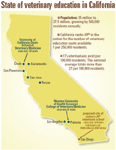UC eyes San Diego vet school
Oakland, Calif. - The nation's 29th veterinary medical program appears on the horizon.
OAKLAND, CALIF. — The nation's 29th veterinary medical program appears on the horizon.
The initiative, stemming from the University of California (UC), calls for expanding the institution's health programs in San Diego. At presstime, the university's Board of Regents' Committee on Educational Policy heard project expansion plans for the university's nursing, medicine, pharmacy, public health and veterinary medicine programs. Addressing the Nov. 14 regents meeting, the UC Advisory Council on Future Growth in the Health Professions expressed support for a 95-percent increase in DVM student enrollment by 2020 as well as continuing efforts toward founding a new UC veterinary school. Once approved by the UC Davis president, provost and Board of Regents, the California Department of Finance and the Legislature map out implementation and give the final go-ahead. Projected price tag: $400 million to $500 million.

Georgia Gov. Sonny Perdue, DVM accepts the "awesome stewardship" of leading 9 million people after his successful re-election bid. He is one of 20 veterinarians elected to federal and state offices. (Photos: Rick Newby)
"It's a lot, I know," concedes Dr. Bennie Osburn, UC-Davis' veterinary school dean. "But we need this expansion. This state is growing by half-a-million people each year."
Illustration by numbers
It's that kind of growth that almost guarantees the regents' all-out endorsement, insiders predict. With a population nearing 37.5 million, California ranks forty-ninth in the nation in the number of DVM student slots available, offering just one seat per 250,000 residents. There are 17 veterinarians in California per 100,000 people compared to a national veterinarian-to-population average of 27. Roughly 6,000 veterinarians are working in the state, but if California were to meet the current national average, an additional 3,367 DVMs would be needed. With a population expected to reach 44 million by 2020, officials estimate 725 veterinarians are needed each year in California to address retirement, growth and demand.

Dr. Bennie Osburn
The data are outlined in the 2004 report "Veterinary Medical Education and the University of California." Current graduate numbers show UC-Davis churning out roughly 123 veterinarians annually, which will rise to 131 next year. Western University of Health Sciences' (Western U) veterinary program, the nation's newest DVM institution, plans to graduate its first class of 81 students in 2007. That total should rise to 100 within the next few years, officials say.
Side-by-side analysis
Despite the modest increase in seats, Dr. Andrew Maccabe, associate director of the Association of American Veterinary Medical Colleges, backs the report's assessment. Considering Canada boasts four schools of veterinary medicine and has fewer residents than California (32 million), it's hard not to justify an expansion. A fifth Canadian veterinary program is projected at the University of Calgary in 2008, he says.

State of veterinary education in California (Source: University of California-Davis School of Veterinary Medicine)
"This is a very good analogy," Maccabe says. "It's hard to believe anyone could look at that and not say veterinary education is underrepresented in California."
For Dr. Don Klingborg, UC-Davis veterinary school associate dean for public programs, the numbers clearly illustrate an inequity.
"Californians are the most disadvantaged when it comes to access to a veterinary education than anywhere else in the country," he says. "None of the health sciences have expanded significantly in 30 years, whereas California's population has probably doubled in that time. We are way behind the curve."
No competition
California's well is so dry when it comes to veterinary education, Dr. Shirley Johnston conveys enthusiasm concerning UC-Davis expansion prospects despite running Western U's DVM program. With Western U based in Pomona, Calif., near Los Angeles, the site of UC-Davis' possible expansion in San Diego is just two hours away.

Dr. Shirley Johnston
"I think it's a wonderful idea," Dean Johnston says. "The state of California is a net importer of veterinarians, and this represents an opportunity for the state to meet its societal obligation. Whether this one school will do that, I don't know, but it's a step in the right direction. In California the population is growing higher than anywhere."